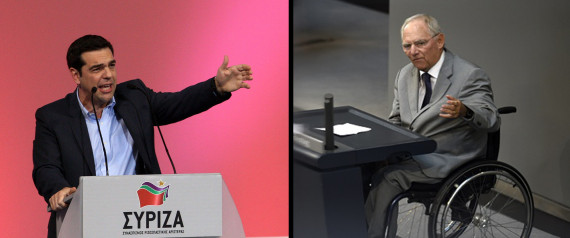 The great paradox of the present debacle over Greece in Europe is that Wolfgang Schäuble, the sober, wheelchair-bound austerian who is German finance minister, and Alexis Tsipras, the fiery, freewheeling populist leader of Syriza, are both right.
The great paradox of the present debacle over Greece in Europe is that Wolfgang Schäuble, the sober, wheelchair-bound austerian who is German finance minister, and Alexis Tsipras, the fiery, freewheeling populist leader of Syriza, are both right.
Schäuble is right that an ever-closer union that tightly binds the economies of Europe through a common currency can only be founded on adherence by all members to agreed rules of supranational sovereignty. Tsipras is completely correct that Greece can never escape ever-more-spiraling-depression through abiding by those rules.
More than the much-emphasized bad blood between the two countries and their leaders, this reality of a double truth is what has prevented any agreement to date. Ironically, it also points the way to the solution because it will give birth to the only sustainable arrangement: a "two-speed Europe" where countries with similar economies and a commitment to common rules form the core with a single currency while others remain within the European Union with all the benefits that entails -- including adjustment, humanitarian and infrastructure funds -- but not within the currency zone.
Gideon Rachman has put the next steps after the Greek vote succinctly in theFinancial Times:
If European leaders were thinking clearly, they should see that rather than punishing Greece, it is now in the EU's interests to do its level best to make sure that Greece can leave the euro, but stay inside the EU with a minimum of pain. If that means giving Greece debt relief as part of the exit package, so be it. Debt relief, in return for Grexit, could make political as well as economic sense.
"Debt relief, in return for Grexit, could make political as well as economic sense."
A Greek exit from the eurozone would thus strengthen the eurozone, not weaken it.
And it would enable the Greeks, who have now made their voice heard in a resounding rejection of supranational sovereignty, master of their own reforms. Indeed, the only hope of reform in such sensitive areas as pensions and taxes is if they are authored by Greeks themselves. There will be lots of pain ahead, but pain with dignity instead of indignity. If it all fails in the end, the Greeks would have no one to blame but themselves. That is the democratic verdict to which they have bound their fate.
And it would enable the Greeks, who have now made their voice heard in a resounding rejection of supranational sovereignty, master of their own reforms. Indeed, the only hope of reform in such sensitive areas as pensions and taxes is if they are authored by Greeks themselves. There will be lots of pain ahead, but pain with dignity instead of indignity. If it all fails in the end, the Greeks would have no one to blame but themselves. That is the democratic verdict to which they have bound their fate.
Other European democracies would also likely be more generous with humanitarian aid and other funds if it was clear these were to help desperate pensioners in Greece rather than rewarding one of its members for breaking the rules everyone else must abide by and getting away with it. That is the nub of the resentment both among the mainstream and the right populist parties in the northern eurozone.
The outstanding spoiler in this scenario is the political impact of the "No" vote in Greece on other left populist parties in the southern eurozone, particularly in Spain, where Podemos and its allies recently took municipal power in both Barcelona and Madrid.
In the first instance. Syriza's landslide rejection of austerity could embolden voters to reject the mainstream parties in Spain, including the ruling People's Party of Spain under Prime Minster Mariano Rajoy, that have stuck to the austerity regime of the eurozone. Yet, when the turmoil of bank collapses, the seizure of savings and further budget cuts and tax increases required to stabilize the Greek situation take hold, Spanish voters may well look past the corruption scandals of the political establishment and decide inching back toward growth is a better option than rejecting the austerity path upon which they have already taken major strides.
The "European dream" envisioned a path to full federalization one day, including of fiscal and defense policies. Incremental steps forward and then regular setbacks have frustrated that goal now for years, leading neither to a Europe that works nor one that doesn't entirely not work but barely manages to muddle on.
It is evident by now that the common currency, which sought to bind nations through the back door of economics, has divided Europe instead of united it further. Nationalism and populist resistance to further integration has surged in the interstices. Going forward the idea of a federal Europe can only be realized through an open political embrace by a coalition of the willing. Those for whom it works should remain; those for whom it doesn't work should not suffer the costs of integration.
Europe has arrived at its moment of double truth. The muddling is over with and the path ahead is clear for all to see.
Original Article
Source: huffingtonpost.com/
Author: Nicolas Berggruen, Nathan Gardels
No comments:
Post a Comment